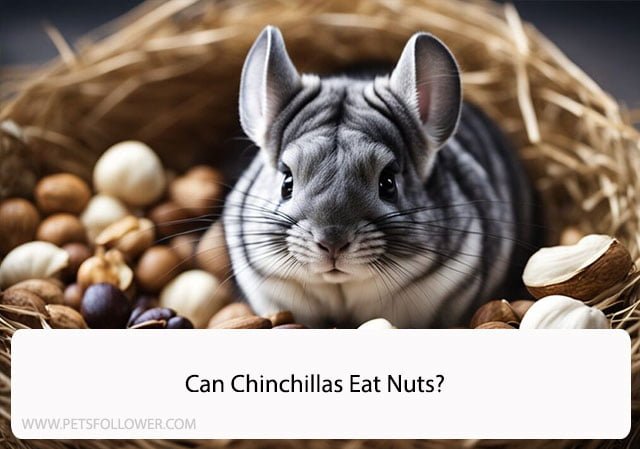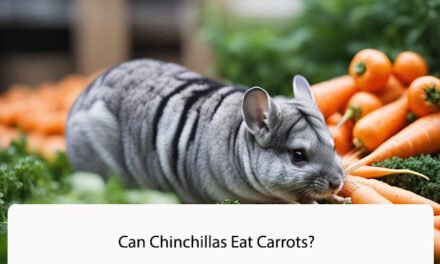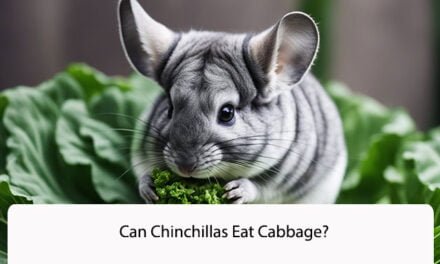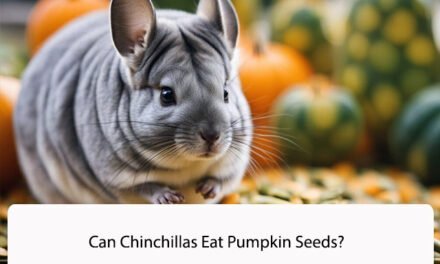Chinchillas are adorable, small, and fluffy rodents that are becoming increasingly popular as pets. As with any pet, it is important to know what foods are safe and healthy for them to consume. One common question that chinchilla owners ask is whether or not their furry friends can eat nuts.
The short answer is that chinchillas can eat some types of nuts, but not all of them. While nuts are a good source of protein and healthy fats, they are also high in fat and can be difficult for chinchillas to digest. It is important to know which nuts are safe for chinchillas to eat and to feed them in moderation. Overfeeding nuts can lead to health problems such as obesity and digestive issues.
In this article, we will explore which nuts are safe for chinchillas to eat and how much they should be fed. We will also discuss the potential health risks associated with feeding chinchillas nuts. By the end of this article, you will have a better understanding of whether or not nuts should be included in your chinchilla’s diet.
Understanding Chinchillas’ Diet

As responsible pet owners, it is important for us to understand the dietary needs of our chinchillas. Chinchillas are herbivores and have a unique digestive system that requires a specific diet to maintain their health and well-being.
The primary component of a chinchilla’s diet should be hay, which provides essential fiber to aid their digestion. We recommend providing unlimited access to high-quality grass hay, such as Timothy or Orchard grass.
In addition to hay, chinchillas also require a small amount of pellets that are specially formulated for their dietary needs. These pellets should be made from high-quality ingredients and should not contain any added sugars or artificial colors. We recommend feeding about 1-2 tablespoons of pellets per day to adult chinchillas.
While chinchillas enjoy a variety of treats, it is important to limit their intake of sugary or fatty foods. Nuts, in particular, should be given sparingly as they are high in fat and can cause digestive issues if given in excess. If you do choose to give your chinchilla nuts, make sure they are unsalted and only offer a small amount as an occasional treat.
Overall, a well-balanced diet consisting of hay, pellets, and limited treats is key to maintaining your chinchilla’s health and happiness. As always, consult with your veterinarian if you have any concerns about your chinchilla’s diet or health.
Can Chinchillas Eat Nuts?

As chinchilla owners, we want to provide our furry friends with a healthy and balanced diet. Nuts are a popular snack for humans, but can chinchillas eat nuts too?
The answer is yes, chinchillas can eat nuts, but only in moderation. Nuts are high in fat and calories, which can lead to obesity and other health problems in chinchillas if overconsumed.
It’s important to note that not all nuts are safe for chinchillas to eat. Some nuts, such as almonds and pistachios, are high in phosphorus, which can lead to bladder and kidney problems in chinchillas. Other nuts, such as macadamia nuts, are toxic to chinchillas and should be avoided at all costs.
Here’s a list of nuts that are safe for chinchillas to eat in small quantities:
- Walnuts
- Hazelnuts
- Pecans
- Brazil nuts
- Cashews
When feeding your chinchilla nuts, make sure to remove the shell and any salt or seasoning. Nuts should be given as an occasional treat and not as a staple in their diet.
In conclusion, chinchillas can eat nuts, but it’s important to choose the right type and feed them in moderation. As responsible chinchilla owners, we should always prioritize their health and well-being by providing them with a balanced diet and plenty of fresh water.
Hazards of Feeding Nuts to Chinchillas

Feeding nuts to chinchillas may seem like a good idea, but it can actually be harmful to their health. In this section, we will discuss the hazards of feeding nuts to chinchillas.
Digestive Issues
Chinchillas have a delicate digestive system, and feeding them nuts can cause digestive issues. Nuts are high in fat and protein, which can be difficult for chinchillas to digest. This can lead to diarrhea, bloating, and other digestive problems.
Choking Risk
Nuts are also a choking hazard for chinchillas. Chinchillas have small mouths and can easily choke on large pieces of nuts. This can be especially dangerous if the chinchilla is left unsupervised while eating nuts.
Nutritional Imbalance
Feeding nuts to chinchillas can also cause a nutritional imbalance. While nuts are high in fat and protein, they are low in other essential nutrients that chinchillas need, such as fiber and vitamins. Feeding nuts to chinchillas regularly can lead to malnutrition and other health problems.
In conclusion, while nuts may seem like a tasty treat for chinchillas, they are not recommended for their diet. Feeding chinchillas a balanced diet of hay, pellets, and fresh vegetables is the best way to keep them healthy and happy.
Safe Foods for Chinchillas
When it comes to feeding chinchillas, it’s important to provide them with a balanced diet that meets their nutritional needs. Here are some safe foods for chinchillas that you can include in their diet.
Hay and Pellets
The foundation of a chinchilla’s diet should be hay and pellets. Timothy hay is a great option for chinchillas as it provides them with the fiber they need to maintain good digestive health. Pellets should be specifically formulated for chinchillas and should not contain nuts, seeds, or dried fruit.
Fresh Vegetables
Fresh vegetables can be a healthy addition to a chinchilla’s diet, but it’s important to introduce them slowly and in small amounts. Vegetables that are high in water content, such as lettuce and cucumber, should be given sparingly as they can cause diarrhea. Safe vegetables for chinchillas include kale, spinach, and carrot tops.
Occasional Treats
While chinchillas do enjoy treats, they should be given sparingly as they can be high in sugar and fat. Safe treats for chinchillas include small pieces of apple, pear, or banana. Nuts, seeds, and dried fruit should be avoided as they can be difficult for chinchillas to digest and can lead to health problems.
Overall, a chinchilla’s diet should be balanced and include a variety of foods. Always provide fresh water and monitor your chinchilla’s eating habits to ensure they are healthy and happy.
Foods to Avoid for Chinchillas
Chinchillas are herbivores and their diet primarily consists of hay and pellets. However, they can also eat a variety of fresh fruits and vegetables as treats. While it’s important to offer your chinchilla a balanced diet, it’s equally important to know what foods to avoid.
Sugary Foods
Chinchillas have a sensitive digestive system, and sugary foods can cause digestive problems and lead to obesity. Avoid giving your chinchilla any sugary treats such as candy, chocolate, or sugary fruits like bananas and grapes. Even dried fruits should be given in moderation as they are high in sugar.
Fatty Foods
Chinchillas are prone to obesity, and fatty foods can contribute to weight gain and other health problems. Avoid giving your chinchilla any fatty treats such as nuts, seeds, and avocados. These foods are high in fat and can lead to digestive problems and liver disease.
Processed Foods
Chinchillas should not be given any processed foods, including human snacks like chips and crackers. These foods are often high in salt and preservatives, which can be harmful to your chinchilla’s health. Stick to natural, fresh foods as treats for your chinchilla.
In summary, it’s important to avoid giving your chinchilla any sugary, fatty, or processed foods. Stick to a balanced diet of hay, pellets, and fresh fruits and vegetables as treats to keep your chinchilla healthy and happy.
How to Introduce New Foods to Chinchillas
When introducing new foods to chinchillas, it’s important to do so gradually and carefully. Chinchillas have sensitive digestive systems and sudden changes in their diet can cause stomach upset or even more serious health problems.
Here are some tips to help you introduce new foods to your chinchilla:
- Start with small amounts: When introducing a new food, start with a small amount and gradually increase the amount over several days. This will give your chinchilla’s digestive system time to adjust to the new food.
- Introduce one food at a time: Introducing multiple new foods at once can make it difficult to determine which food is causing any potential digestive issues. It’s best to introduce one new food at a time and wait a few days before introducing another.
- Monitor your chinchilla’s behavior: Keep an eye on your chinchilla’s behavior after introducing a new food. If they seem lethargic, have diarrhea, or show any other signs of discomfort, remove the new food from their diet and consult with a veterinarian.
- Offer a variety of foods: Chinchillas require a balanced diet that includes hay, pellets, and fresh vegetables. Offering a variety of foods will help ensure that your chinchilla is getting all the nutrients they need.
- Avoid foods that are high in fat or sugar: Chinchillas are prone to obesity and diabetes, so it’s important to avoid feeding them foods that are high in fat or sugar. This includes most nuts, which should only be given as an occasional treat.
By following these tips, you can help ensure that your chinchilla stays healthy and happy while enjoying a variety of nutritious foods.
Frequently Asked Questions

What vegetables are safe for chinchillas to eat?
Chinchillas can eat a variety of vegetables, but it is important to ensure that they are safe for them to consume. Some safe vegetables for chinchillas include carrots, kale, spinach, and parsley. However, it is important to note that vegetables should be given in moderation as too much can cause digestive issues.
What are some appropriate treats for chinchillas?
Chinchillas enjoy treats, but it is important to choose the right ones. Some appropriate treats for chinchillas include rose hips, dried herbs, and hay cubes. It is important to avoid sugary treats and fruits as they can cause health problems.
Is it safe for chinchillas to eat apples?
Apples are safe for chinchillas to eat, but they should be given in moderation. Apples are high in sugar and can cause digestive issues if given in excess. It is recommended to remove the seeds and core before feeding the apple to your chinchilla.
Which fruits are safe for chinchillas to eat?
Chinchillas can eat a variety of fruits, but they should be given in moderation due to their high sugar content. Some safe fruits for chinchillas include strawberries, raspberries, and blueberries. However, it is important to remove any seeds or pits before feeding them to your chinchilla.
What is the natural diet of chinchillas?
Chinchillas are herbivores and their natural diet consists of hay, grasses, and plants. In captivity, it is important to provide them with a diet that is similar to their natural diet. This can include hay, pellets, and fresh vegetables.
Can chinchillas have peanuts?
Peanuts are not recommended for chinchillas as they are high in fat and can cause digestive issues. It is important to avoid giving your chinchilla any nuts or seeds that are high in fat.





